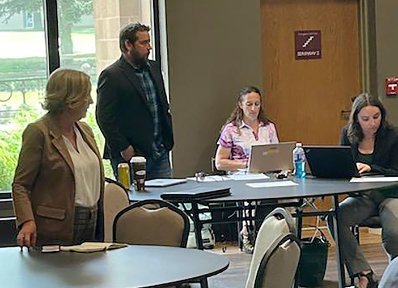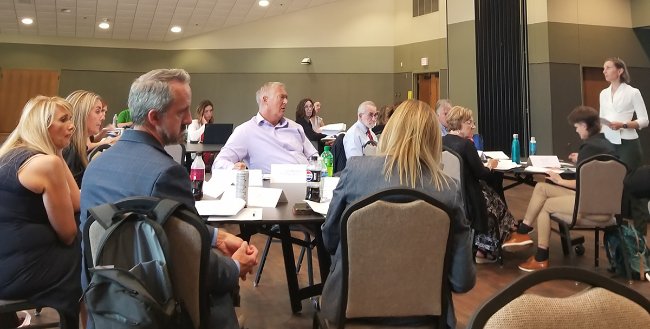Vol. 68, Issue 29
View more issues of The Valued Voice
Sign Up for WHA's Newsletter
Click here to view past issues
IN THIS ISSUE
- Governor’s Task Force on Healthcare Workforce Welcomes WHA Feedback
- Worker's Comp Health Care Provider Advisory Committee Seeks Hospital Representatives
- Guest Column: The Complexities Surrounding GLP-1 Agonist Drugs
- Last Chance in 2024: Implement MOVIN to Enhance Patient Care and Outcomes
- Enhancing Capacity in Treating Opioid Use Disorder: Free Training and Support Program for Healthcare Professionals in Wisconsin
EDUCATION EVENTS
Oct. 30, 2025
careLearning Overview: Learning Management System (LMS)Nov. 6, 2025
Hospital Board EducationJan. 28, 2026
2026 WHA Health Care Leadership AcademyClick here to view education event calendar
View more issues of The Valued Voice
Sign Up for WHA's Newsletter
Thursday, July 18, 2024
 WHA Senior Vice President of Workforce and Clinical Practice Ann Zenk had an opportunity on July 11 to provide feedback on the latest version of their Concept Recommendations to the Governor’s Task Force on the Health Care Workforce at their fourth meeting, held at the University of Wisconsin Green Bay. After Zenk’s public comments, Task Force Facilitator Dr. Hannah Maxey noted, “We’re glad the WHA is happy with the changes made.”
WHA Senior Vice President of Workforce and Clinical Practice Ann Zenk had an opportunity on July 11 to provide feedback on the latest version of their Concept Recommendations to the Governor’s Task Force on the Health Care Workforce at their fourth meeting, held at the University of Wisconsin Green Bay. After Zenk’s public comments, Task Force Facilitator Dr. Hannah Maxey noted, “We’re glad the WHA is happy with the changes made.”
On June 25, 2024, WHA sent a letter to task force chair Lieutenant Governor Sara Rodriguez and task force members. In the letter Zenk noted, “WHA and our members, including those hospital leaders on the Governor’s Task Force, agree with and support many of the Concept Recommendations presented to the group for weighting and prioritization on June 6, 2024, but we are also concerned that some of the strategies voiced by task force members or invited presenters are not included in the document discussed in June.” On July 11, Zenk reviewed key suggestions from the WHA letter and thanked the task force leaders for revising the recommendations as suggested by WHA.

The Concept Recommendations provide a foundation for the items the task force will submit to Governor Tony Evers for his consideration for inclusion in the 2025-2027 biennial budget. At WHA’s urging, the July 11 draft of the recommendations now include WHA-crafted Grow Our Own grants, revising the limits on qualified health professionals who can teach health care students to expand the pool of applicants for health professions faculty positions, and more robust resources to support health care career exploration, such as resources for high school health science pathways. The July 11 recommendations were also revised to remove a recommendation to increase Wisconsin Department of Health Services “regulatory capacity.” As WHA’s letter notes, “…we do urge caution about the unintended consequences of recommendations that, while well-intended, will divert precious patient-care resources away from the bedside to regulatory compliance and reduce access to care.”
In her public comments to the task force, Zenk urged task force members and leadership to include in their recommendations measures that will help a shrinking workforce care for the increased health care demand created an aging population: “The revisions to the recommendations the task force is reviewing are a great step. We ask for your further action to sustain the $5 million increase to allied health training grants in the current budget.” Zenk added, “We also need your help to relieve pressures that are burdening and burning out health care teams, such as insurance precertifications that turn into denials, requests for more data and the need for more approvals before payment is received for care that has already been provided.”
Governor’s Task Force on Healthcare Workforce Welcomes WHA Feedback
WHA provides public comment on task force recommendations
 WHA Senior Vice President of Workforce and Clinical Practice Ann Zenk had an opportunity on July 11 to provide feedback on the latest version of their Concept Recommendations to the Governor’s Task Force on the Health Care Workforce at their fourth meeting, held at the University of Wisconsin Green Bay. After Zenk’s public comments, Task Force Facilitator Dr. Hannah Maxey noted, “We’re glad the WHA is happy with the changes made.”
WHA Senior Vice President of Workforce and Clinical Practice Ann Zenk had an opportunity on July 11 to provide feedback on the latest version of their Concept Recommendations to the Governor’s Task Force on the Health Care Workforce at their fourth meeting, held at the University of Wisconsin Green Bay. After Zenk’s public comments, Task Force Facilitator Dr. Hannah Maxey noted, “We’re glad the WHA is happy with the changes made.”On June 25, 2024, WHA sent a letter to task force chair Lieutenant Governor Sara Rodriguez and task force members. In the letter Zenk noted, “WHA and our members, including those hospital leaders on the Governor’s Task Force, agree with and support many of the Concept Recommendations presented to the group for weighting and prioritization on June 6, 2024, but we are also concerned that some of the strategies voiced by task force members or invited presenters are not included in the document discussed in June.” On July 11, Zenk reviewed key suggestions from the WHA letter and thanked the task force leaders for revising the recommendations as suggested by WHA.

The Concept Recommendations provide a foundation for the items the task force will submit to Governor Tony Evers for his consideration for inclusion in the 2025-2027 biennial budget. At WHA’s urging, the July 11 draft of the recommendations now include WHA-crafted Grow Our Own grants, revising the limits on qualified health professionals who can teach health care students to expand the pool of applicants for health professions faculty positions, and more robust resources to support health care career exploration, such as resources for high school health science pathways. The July 11 recommendations were also revised to remove a recommendation to increase Wisconsin Department of Health Services “regulatory capacity.” As WHA’s letter notes, “…we do urge caution about the unintended consequences of recommendations that, while well-intended, will divert precious patient-care resources away from the bedside to regulatory compliance and reduce access to care.”
In her public comments to the task force, Zenk urged task force members and leadership to include in their recommendations measures that will help a shrinking workforce care for the increased health care demand created an aging population: “The revisions to the recommendations the task force is reviewing are a great step. We ask for your further action to sustain the $5 million increase to allied health training grants in the current budget.” Zenk added, “We also need your help to relieve pressures that are burdening and burning out health care teams, such as insurance precertifications that turn into denials, requests for more data and the need for more approvals before payment is received for care that has already been provided.”
Vol. 68, Issue 29
Thursday, July 18, 2024
Governor’s Task Force on Healthcare Workforce Welcomes WHA Feedback
WHA provides public comment on task force recommendations
 WHA Senior Vice President of Workforce and Clinical Practice Ann Zenk had an opportunity on July 11 to provide feedback on the latest version of their Concept Recommendations to the Governor’s Task Force on the Health Care Workforce at their fourth meeting, held at the University of Wisconsin Green Bay. After Zenk’s public comments, Task Force Facilitator Dr. Hannah Maxey noted, “We’re glad the WHA is happy with the changes made.”
WHA Senior Vice President of Workforce and Clinical Practice Ann Zenk had an opportunity on July 11 to provide feedback on the latest version of their Concept Recommendations to the Governor’s Task Force on the Health Care Workforce at their fourth meeting, held at the University of Wisconsin Green Bay. After Zenk’s public comments, Task Force Facilitator Dr. Hannah Maxey noted, “We’re glad the WHA is happy with the changes made.”On June 25, 2024, WHA sent a letter to task force chair Lieutenant Governor Sara Rodriguez and task force members. In the letter Zenk noted, “WHA and our members, including those hospital leaders on the Governor’s Task Force, agree with and support many of the Concept Recommendations presented to the group for weighting and prioritization on June 6, 2024, but we are also concerned that some of the strategies voiced by task force members or invited presenters are not included in the document discussed in June.” On July 11, Zenk reviewed key suggestions from the WHA letter and thanked the task force leaders for revising the recommendations as suggested by WHA.

The Concept Recommendations provide a foundation for the items the task force will submit to Governor Tony Evers for his consideration for inclusion in the 2025-2027 biennial budget. At WHA’s urging, the July 11 draft of the recommendations now include WHA-crafted Grow Our Own grants, revising the limits on qualified health professionals who can teach health care students to expand the pool of applicants for health professions faculty positions, and more robust resources to support health care career exploration, such as resources for high school health science pathways. The July 11 recommendations were also revised to remove a recommendation to increase Wisconsin Department of Health Services “regulatory capacity.” As WHA’s letter notes, “…we do urge caution about the unintended consequences of recommendations that, while well-intended, will divert precious patient-care resources away from the bedside to regulatory compliance and reduce access to care.”
In her public comments to the task force, Zenk urged task force members and leadership to include in their recommendations measures that will help a shrinking workforce care for the increased health care demand created an aging population: “The revisions to the recommendations the task force is reviewing are a great step. We ask for your further action to sustain the $5 million increase to allied health training grants in the current budget.” Zenk added, “We also need your help to relieve pressures that are burdening and burning out health care teams, such as insurance precertifications that turn into denials, requests for more data and the need for more approvals before payment is received for care that has already been provided.”
IN THIS ISSUE
- Governor’s Task Force on Healthcare Workforce Welcomes WHA Feedback
- Worker's Comp Health Care Provider Advisory Committee Seeks Hospital Representatives
- Guest Column: The Complexities Surrounding GLP-1 Agonist Drugs
- Last Chance in 2024: Implement MOVIN to Enhance Patient Care and Outcomes
- Enhancing Capacity in Treating Opioid Use Disorder: Free Training and Support Program for Healthcare Professionals in Wisconsin

